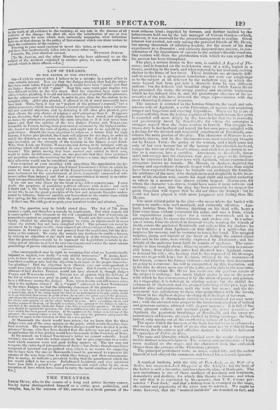LAW OF TREASON.
TO THE EDITOR OP THE SPECTATOR.
Sin—I wish to correct what I believe to be a mistake in a point of law in vour valuable journal. You say that the Judges decided, that had the objeeiion been made before FaosT's pleadinkit would have Teen " good," and that six Judges thought it still good." -Now this same word good implies two wry differeut results in the two Cases. Had the objection beets made and allowed pleading, it would not have caused the etrquittal of the prisoners, but the tirliournment of the Court, in order to give time for the statute to be complied with. After plea pleaded, if' allowed at all, it must necessarily have been fatal. Thus, then, it was no " neglect of the prisoner's counsel," but a skilful manseuvre, which nearly turned a formal and preliminary into a substantial and material objection, and by deferringit till after plea pleaded, gave their clients the only chance of reaping a solul rulvantuge from it. It appears to me, then:Mee, that a technical objection having liven stated, and disposed of, leaves the prisoners in precisely the same situation as if it lets! never beef, taken ; ;mil that the opinion of the two Judges PARKE favourable to FROST, having been pronounced erroneous by the highest authority, tended to defeat the ends of justice, and ought not to be upheld by :Inv good citizen. Should the Sallie 0101:tit/II be talsen on a future trial toe Idgit trenson, if iejilre plea 'pleaded, the Court will adjourn for ten days, in order to satisfy the statutes, as was done on the trials in 1741i : Wafter, it will be at once overrules!, on the strengths of the decision in the Queen orsus Frost. Why, then, I ask, are FROST, Wthr.tams, and jON ES, to he indulged with an advantage which will never he accorded to any one hereafter accused of high treason ? The points having first been mooted and settled in their ease, ought to make no difference, since no one pretends that they have mist:lined any prejudiee, unless the receiving the list of witnesss some days earlier than they otherwise would can lie considered such. I ant surprised at your inserting with something like approbation the declamatory and inaccurate postage limn Colonel TtIOMPSON'S letter, its sthich lie seems to treat a Jury as a part of the Executive—to forget that a Jure is a mere instrument for the ascertninment oflocis, (originidly conumsed ne witnesses rather than judges,) and that a recommendation to mercy is =extralegal interposition,which the hue does not recognize.
I ant not one who thirst fim the blood of my fellow-countrymen. I even doubt the propriety of punishing political offences with death ; and such I doubt not, is the feeling of many who have raised these areannents : but 1 do not like to see the great principles of the law awl accurate thoughts undermined by fallacies however amiable mid benevolent be the motive from which they spring„ for the evil remains while the good passes (may. Believe me, Sir, with great respect, your constant reader and admirer,
P.S. The question may be briefly stated thus. The Act of 7th Anne created a right, and therethre a remedy by implication. But what remedy did it contemplate? One adequate to the evil complained of, that of hurrying on proceedings aguinst an unprepared prisoner. Would not this reined.: lie sufficientlyattained by milieu lug the prisoner to claim an adiema.mecit in caws where the statute has not -lwen contplied with The prisoner ran never be presumed to be inui.,s since counsel are always assigned him; and the
omission in Fnosrs ease did not proceed from the negligence, lett the dexterity of his counsel. To carry the remedy any further—to enable a lawyer, by waiving an objection at the right and making it at the wrong time, to hate the proceedings—would he to represent the Legislature ns astute in devising arts of chicane to defeat its own enactments and renLv the most solemn proceedings of justice ridiculous and inconclusive.


























 Previous page
Previous page